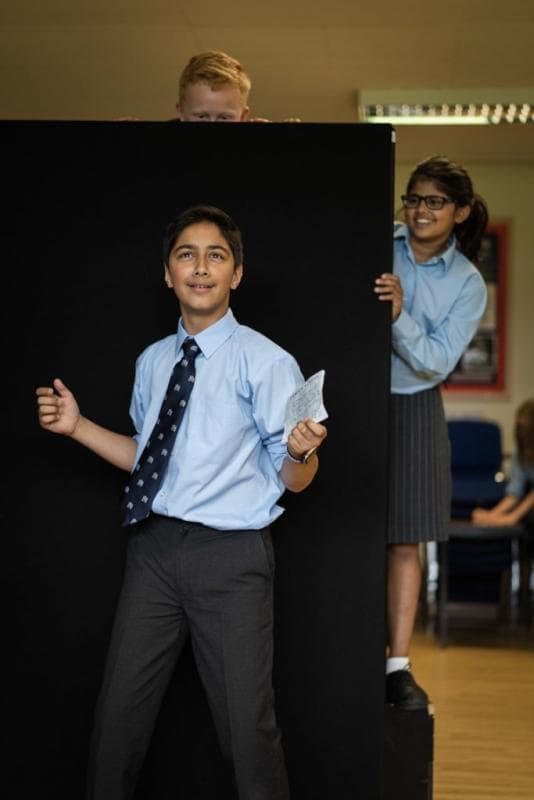Developing confident young people and promoting in them an active appreciation of the performing arts, through creative and practical explorations of their world.
“If you were born with the ability to change someone’s perspective or emotions, never waste that gift. It is one of the most powerful gifts God can give—the ability to influence.”
Drama at Ipswich School does just that. We pride ourselves on ensuring our pupils develop into confident young people and promote in them an active appreciation of the performing arts, through creative and practical explorations of their world. We provide an exciting wealth of opportunities both in and out of the classroom.

Lower School
The introduction of core dramatic techniques and theatre conventions provides pupils with a superb foundation from which to create meaningful and relevant theatre. They will explore a range of stimuli: music, poetry, art, stories, plays and issues. This history of theatre is also brought to life through practical improvisations and interpretation of well known scripts. Pupils are encouraged to become creative thinkers, clear communicators and confident performers.
Middle School
In Year 9, pupils have the opportunity to select to be part of the Silver Level Arts Award programme. This is a fully accredited qualification that will further pupil’s passion for the subject as well as exploring new skills they haven’t yet acquired. Pupils collect evidence in an individual arts log or portfolio of their experiences of:
- actively participating in any art form
- at least one arts event and their review of that event
- researching the career and work of an artist or craftsperson
- passing on an arts skill
This Award currently has a limited number of places and is run in an after school session once a week throughout the course of the academic year.
At GCSE, following the AQA specification, our drama pupils learn to evaluate as well as to create and perform. They undertake study in three key areas:
Component 1: A written exploration of a set text and a piece of live theatre, as well as learning important terminology belonging to the world of stagecraft. Pupils learn through practical exploration.
Component 2: Pupils devise work that explores themes and issues, as well as taking a script from the page to the stage through either acting or design.
Component 3: A practical performance of a scripted play of the pupil’s choice.
Previous experience of Drama is not necessary to succeed at this level; we merely require enthusiasm and passion for the subject as well as an existing confidence performing onstage. However, a good grasp of public speaking in the English language is essential to fully access the course.
“Drama has helped me to grow, not only as a performer but also as a person. It has filled me with confidence and ambition, and affirmed my love for the subject which I had never loved that way before” Year 11 Drama student
Sixth Form
The theoretical study of practitioners, theatre history and theatrical genres underpin practical explorations, encouraging our pupils to interpret text in challenging and innovative ways. Pupils will perform published scripts, and will learn to devise and write their own work. The course provides you with transferable skills, including teamwork, problem solving and the ability to deal with challenging situations, that are desirable in many different careers. In fact, recent research concluded that drama and economics were a good bet for students wanting to take an essay-based subject at a Russell Group university.
We currently study the Edexcel syllabus and offer the two-year linear course. This is comprised of the following components:
1. DEVISING 40%
• Creating an original piece of theatre based on a stimulus and a key practitioner. Students can take the role of performer/designer/director.
• A portfolio evidencing the devising process and evaluating the final product.
2. TEXT IN PERFORMANCE 20%
• A group performance of an extract from a professionally published play
• A monologue/duologue from a published play.
3. THEATRE MAKERS IN PRACTICE 40% (WRITTEN EXAM)
• Evaluation of live theatre
• Deconstruction of a text from page to stage in light of the work of a key practitioner.
• Interpreting a performance text and re-imagining a directorial concept.
“Thank you for letting us have so much freedom; I don’t think many drama teachers would be brave enough” Sixth Form student
In drama, with great risk comes great reward.
Exam results
The average of the results in Drama over the most recent three year period (2023, 2022, 2021) is:
| GCSE | |
| 9 | 32% |
| 9-8 | 72% |
| 9-7 | 83% |
| 9-4 | 100% |
| A Level | |
| A* | 53% |
| A* – A | 66% |
| A* – B | 100% |

